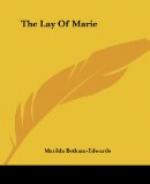MATILDA BETHAM.
1816
TO
Lady BEDINGFELD.
To whom,—as Fancy,
taking longer flight,
With folded arms
upon her heart’s high swell,
Floating the while in circles
of delight,
And whispering
to her wings a sweeter spell
Than she has ever aim’d
or dar’d before—
Shall I address this theme
of minstrel lore?
To
whom but her who loves herself to roam
Through tales of earlier times,
and is at home
With heroes and fair dames,
forgotten long,
But for romance, and lay,
and lingering song?
To whom but her, whom, ere
my judgment knew,
Save but by intuition, false
from true,
Seem’d to me wisdom,
goodness, grace combin’d;
The ardent heart; the lively,
active mind?
To whom but her whose friendship
grows more dear,
And more assur’d, for
every lapsing year?
One whom my inmost thought
can worthy deem
Of love, and admiration, and
esteem!
PREFACE
As there is little, in all I have been able to collect respecting Marie, which has any thing to do with the Poem, I have chosen to place such information at the end of the book, in form of an Appendix, rather than here; where the only things necessary to state are, that she was an Anglo-Norman Minstrel of the thirteenth century; and as she lived at the time of our losing Normandy, I have connected her history with that event: that the young king who sees her in his progress through his foreign possessions is our Henry III.; and the Earl William who steps forward to speak in her favour is William Longsword, brother to Richard Coeur de Lion. Perhaps there is no record of minstrels being called upon to sing at a feast in celebration of a victory which involves their own greatest possible misfortune; but such an incident is not of improbable occurrence. It is likely, also, that a woman, said to be more learned, accomplished, and pleasing, than was usually the case with those of her profession, might have a father, who, with the ardour, the disobedience, the remorse of his heroic master, had been, like him, a crusader and a captive; and in the after solitude of self-inflicted penitence, full of romantic and mournful recollections, fostered in the mind of his daughter, by nature embued with a portion of his own impassioned feelings, every tendency to that wild and poetical turn of thought which qualified her for a minstrel; and, after his death, induced her to become one.
* * * * *




